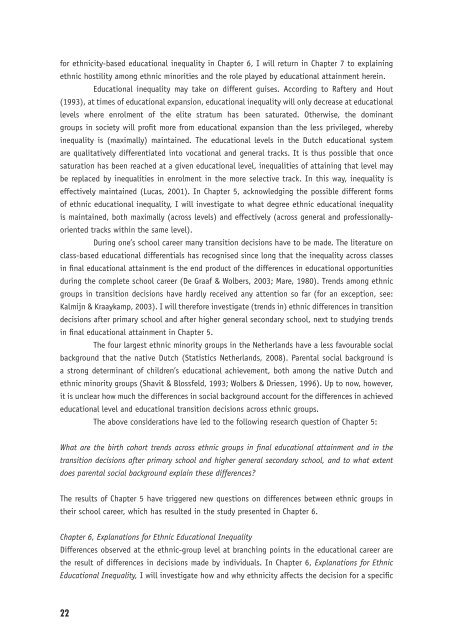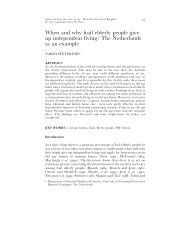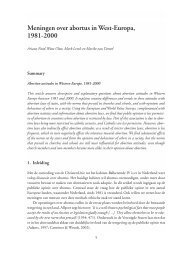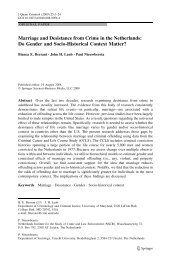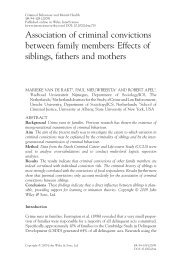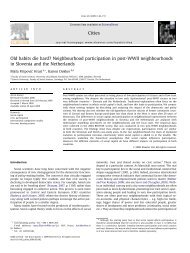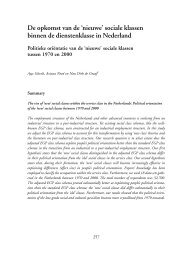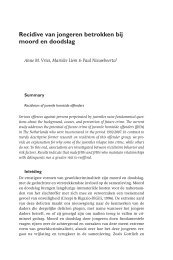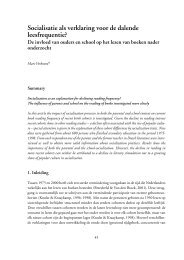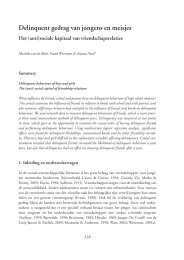Ethnic Hostility among Ethnic Majority and Minority Groups
Ethnic Hostility among Ethnic Majority and Minority Groups
Ethnic Hostility among Ethnic Majority and Minority Groups
You also want an ePaper? Increase the reach of your titles
YUMPU automatically turns print PDFs into web optimized ePapers that Google loves.
for ethnicity-based educational inequality in Chapter 6, I will return in Chapter 7 to explaining<br />
ethnic hostility <strong>among</strong> ethnic minorities <strong>and</strong> the role played by educational attainment herein.<br />
Educational inequality may take on different guises. According to Raftery <strong>and</strong> Hout<br />
(1993), at times of educational expansion, educational inequality will only decrease at educational<br />
levels where enrolment of the elite stratum has been saturated. Otherwise, the dominant<br />
groups in society will profi t more from educational expansion than the less privileged, whereby<br />
inequality is (maximally) maintained. The educational levels in the Dutch educational system<br />
are qualitatively differentiated into vocational <strong>and</strong> general tracks. It is thus possible that once<br />
saturation has been reached at a given educational level, inequalities of attaining that level may<br />
be replaced by inequalities in enrolment in the more selective track. In this way, inequality is<br />
effectively maintained (Lucas, 2001). In Chapter 5, acknowledging the possible different forms<br />
of ethnic educational inequality, I will investigate to what degree ethnic educational inequality<br />
is maintained, both maximally (across levels) <strong>and</strong> effectively (across general <strong>and</strong> professionallyoriented<br />
tracks within the same level).<br />
During one’s school career many transition decisions have to be made. The literature on<br />
class-based educational differentials has recognised since long that the inequality across classes<br />
in fi nal educational attainment is the end product of the differences in educational opportunities<br />
during the complete school career (De Graaf & Wolbers, 2003; Mare, 1980). Trends <strong>among</strong> ethnic<br />
groups in transition decisions have hardly received any attention so far (for an exception, see:<br />
Kalmijn & Kraaykamp, 2003). I will therefore investigate (trends in) ethnic differences in transition<br />
decisions after primary school <strong>and</strong> after higher general secondary school, next to studying trends<br />
in fi nal educational attainment in Chapter 5.<br />
The four largest ethnic minority groups in the Netherl<strong>and</strong>s have a less favourable social<br />
background that the native Dutch (Statistics Netherl<strong>and</strong>s, 2008). Parental social background is<br />
a strong determinant of children’s educational achievement, both <strong>among</strong> the native Dutch <strong>and</strong><br />
ethnic minority groups (Shavit & Blossfeld, 1993; Wolbers & Driessen, 1996). Up to now, however,<br />
it is unclear how much the differences in social background account for the differences in achieved<br />
educational level <strong>and</strong> educational transition decisions across ethnic groups.<br />
The above considerations have led to the following research question of Chapter 5:<br />
What are the birth cohort trends across ethnic groups in fi nal educational attainment <strong>and</strong> in the<br />
transition decisions after primary school <strong>and</strong> higher general secondary school, <strong>and</strong> to what extent<br />
does parental social background explain these differences?<br />
The results of Chapter 5 have triggered new questions on differences between ethnic groups in<br />
their school career, which has resulted in the study presented in Chapter 6.<br />
Chapter 6, Explanations for <strong>Ethnic</strong> Educational Inequality<br />
Differences observed at the ethnic-group level at branching points in the educational career are<br />
the result of differences in decisions made by individuals. In Chapter 6, Explanations for <strong>Ethnic</strong><br />
Educational Inequality, I will investigate how <strong>and</strong> why ethnicity affects the decision for a specifi c<br />
22


